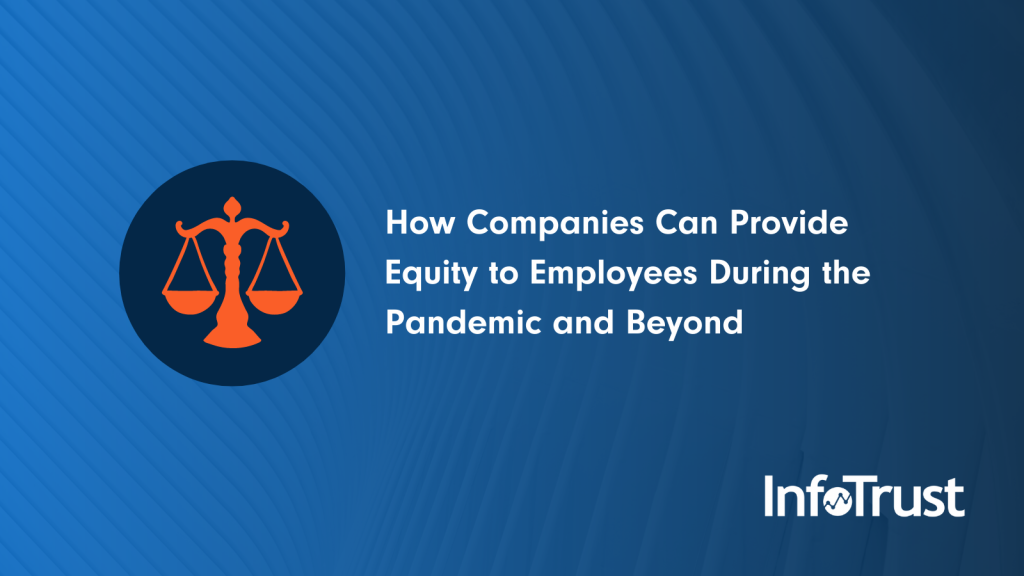This article was written by InfoTrust’s CEO Alex Yastrebenetsky and Head of Talent Acquisition and Operations Manager Lisa Wilms.
Say you and your family are watching a baseball game behind the outfield fence. It’s a tall fence that doesn’t obstruct your vision, although it’s impossible for your small child to watch the game. You’re probably much more capable of seeing over the fence, even without assistance, than your child due to your height advantage.
Everyone’s needs are slightly different, and sometimes, people might need more assistance than others to achieve the same outcome. In this case, the child may need to stand on multiple boxes, while you can manage without any support.
The most effective companies focus on equity—giving everyone the support they need—instead of equality, which consists of treating everyone as if they are the same. In the business world, few situations have shown the importance of equity as starkly as COVID-19.
At the beginning of the pandemic, InfoTrust surveyed our employees to see who was the most stressed and why. It immediately became clear that some people needed more of a boost than others: parents and women.
Data has emerged over the last few months to bear out these findings. In May, a Harvard Business Review article warned that the pandemic was putting companies at risk of losing female talent. Likewise, a recent New York Times article showed that the pandemic has hit women from multiple fronts. Not only have layoffs and shutdowns affected female-dominated industries, but because of school and daycare closures, women have also had to bear the burden of childcare more than their male counterparts.
We are still months away from some kind of normality, and it’s likely that the pandemic’s effects will persist even longer. What can companies do to support women and parents in this difficult moment? Based on our experience, here are some equitable actions employers can take right now, plus some recommendations for moving forward with equity in mind.
Provide Equitable Support
Even in the most highly functional teams, work cannot—and should not—always come first. This is especially true for parents juggling jobs, full-time childcare, and day-to-day chores during the coronavirus pandemic.
At InfoTrust, we focused on initiatives designed to alleviate some of parents’ greatest stresses. We created a Covid-care stipend available to parents between August and December 2020 to help cover the cost of childcare and tutors.
We provided parents with a meal stipend, so they could receive several months of prepared food or groceries, removing the added burden of shopping and meal preparation.
We also created after-school computer programming classes for students between the ages of eight and thirteen. Not only did this give children something interesting to do while their parents worked, but it also provided valuable STEM skills to the students involved, most of whom were girls.
By listening to our employees’ needs, we were able to create better solutions for the problems they were facing. Equitable support is most effective when it targets specific hardships.
Encourage Open Communication
These initiatives were designed to help parents, but we made it clear to the whole company why we were offering this support. Our leaders explained that equity means meeting challenges as a team. If we wanted to come out on the other side of the pandemic, we needed to work together, even if it meant giving certain team members additional resources.
If you’re a leader, we recommend sharing with your employees where you’re struggling. As a dad of three, Alex could speak candidly about the stresses he faced. When leaders show vulnerability, it not only shows their humanity, but it also helps cultivate a culture of empathy among employees.
In this particular case, Alex’s testimony also helped conquer caregiver bias, which negatively impacts women and positively impacts men. Caregiver bias crops up in unconscious but powerful ways. For example, when a crying baby interrupts a Zoom meeting, other attendees form immediate impressions based on the gender of the parent. When a woman cares for the child, they are perceived as “distracted” from their work, while male caregivers are often lauded for stepping up to the plate.
When leaders erase the stigma around caregiving, it creates a more supportive, equitable environment.
Increase Flexibility
Pre-pandemic, work flexibility was something that the most successful companies considered. Countless studies suggest that more flexible work environments lead to increased productivity and happy employees. During the pandemic, though, flexibility moved from a perk to a must-have. We learned that the more flexible we could be with our employees, the more they—and our business—flourished.
InfoTrust implemented a flexible schedule policy that allowed parents to set their own hours. For example, one of our employees has three children, and both he and his wife need to work. Lately, he has set his work schedule from five in the morning to 11:00 p.m., with large, regular chunks blocked off so he can take turns with childcare. His colleagues know that he’s unavailable for four-hour blocks, and if something urgent crops up during that time, someone steps in to help.
If possible, we also recommend increasing the amount of people you have on staff. InfoTrust initially went into COVID determined to protect our employees’ jobs. We created a no-layoff pledge and instituted a hiring freeze to make sure we didn’t create any instability.
Once we were sure we could absorb the long-term impact, we reversed the freeze and added more employees. That way, we could have capacity when people got sick, needed a mental health day, or needed coverage for any other reason.
Conduct Better Meetings
In this new virtual world, we also discovered the importance of conducting better meetings. Before the pandemic, we had a mandatory camera-on policy for meetings because we thought it would foster stronger relationships. During the pandemic, we received feedback that the policy was actually harming our culture because employees worried about their appearance or the possibility that their child could burst into the room at any moment. Now, cameras are optional.
We identified which meetings were mandatory and which were optional, so people had more flexibility with their attendance. We also began recording our meetings, so if employees needed to miss, they could watch at a convenient time. These new policies alleviate stress for the whole team.
Reorient Your Focus
When stress arises, you have two choices: feel helpless or shift your focus to things you can control. So, InfoTrust decided to make our success this year about more than just surviving.
We focused, not only on opportunities to support our employees, but also on ways that our organization could support others in need. The InfoTrust Foundation donated over $25,000 to a variety of causes dear to our employees’ hearts: support for an orphanage in Uganda, typhoon relief in the Philippines, and meals for local families in need.
For every equitable initiative we took, both inside and outside the company, we shifted our focus to long-term outcomes. Many companies focus on their immediate expenses and say, “It costs too much to subsidize childcare or hire more people.” That’s a short-sighted perspective.
When companies lose talent, their culture and productivity take a hit. They incur significant acquisition costs, and they’re forced to spend precious time and resources on training. Anything you can do to retain your team will provide long-term benefits.
When you’re a privately owned company, these kinds of decisions are easier to make. Nevertheless, public companies should still be prepared to show shareholders the value of the long game. It’s okay to take a small financial hit for more inclusive outcomes. They will pay off.
Equity Evolves
While women were leaving other companies in droves this year, InfoTrust had more women promoted this year than ever before. The only woman who left this year did so in order to accept a large promotion. (And we couldn’t be prouder!) To us, that indicates that we’re doing something right.
Many of the lessons we’ve learned this year will last beyond COVID-19. We’ll continue to offer computer programming classes; we’ll keep flexible meetings; and we’ll continue evaluating who needs support and what we can do to provide it.
Regular evaluation is important because equity evolves. This year, parents needed a leg up, but next year, it might be our entry-level employees or remote employees, and we’ll have to come up with new solutions to meet their needs.
Equity also requires intention. It won’t happen on its own. Rest assured, though—intentionality pays off. Your company’s power comes from its people, and it’s worth making the effort to continue to empower them to be their best, both at work and in other parts of their lives.



